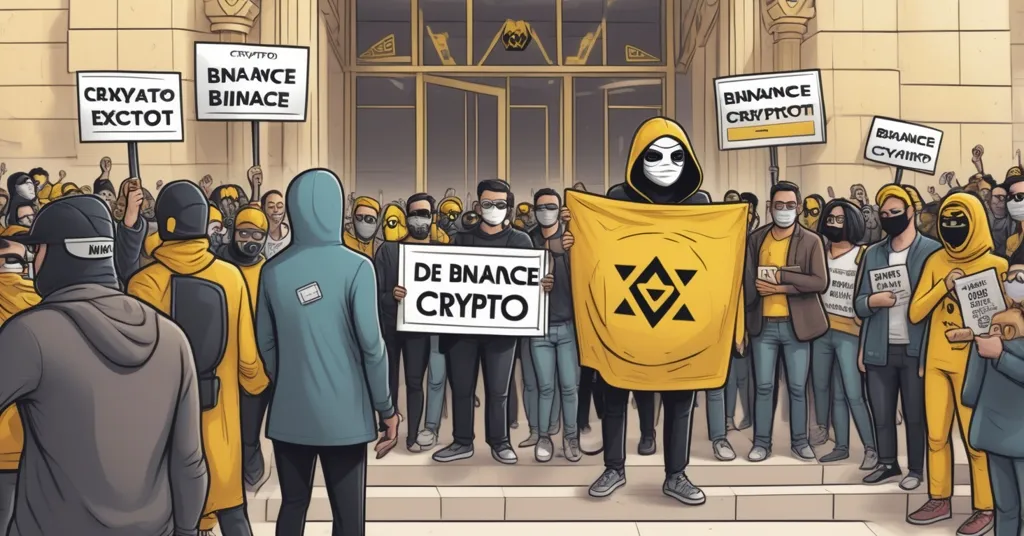Binance Fires Employee for Insider Trading During Crypto Launch

Binance Terminates Employee for Exploiting Insider Information During New Cryptocurrency Launch
Binance, one of the world’s leading cryptocurrency exchanges, has decisively acted against an employee who exploited confidential information to profit from a new cryptocurrency launch. The employee, Freddie Ng, used his insider knowledge to engage in front-running, a practice that undermines the integrity and trust essential to the growth of the crypto industry.
- Binance terminates employee for insider trading
- Employee used confidential info to profit from new cryptocurrency launch
- Front-running described as a breach of company policy
- Insider trading detected via community tips
- Binance announces via official Twitter account
The Incident
Freddie Ng, once a Binance employee, found himself in hot water after making around $113,600 by trading tokens based on non-public information about an upcoming token generation event—or what we’ll call a new cryptocurrency launch for the uninitiated. Front-running, as this nefarious action is known, involves using confidential info to buy or sell assets before the public, securing an unfair advantage. Binance didn’t just fire Ng; they yeeted him out of the crypto space, sending a clear message that this kind of behavior is unacceptable.
Front-running isn’t just a breach of company policy; it’s a slap in the face to everyone who believes in the fairness and potential of cryptocurrencies. For Bitcoin maximalists and crypto enthusiasts alike, these actions erode the very trust we’re trying to build in a decentralized financial future.
Detection and Response
The insider trading came to light thanks to vigilant community members who tipped off Binance, leading to an internal audit that confirmed Ng’s unethical activities. Binance’s response was swift: they suspended Ng, launched a thorough investigation, and committed to enhancing their internal controls and compliance measures. The company also announced the incident via a tweet from their official wallet account, showcasing their transparency.
Binance’s whistleblower program played a crucial role in this detection. By offering rewards for reporting unethical behavior, they encourage community members to stay vigilant and help maintain the integrity of the platform. This proactive approach demonstrates Binance’s commitment to rooting out bad actors and upholding ethical standards.
Industry Implications
This incident is more than just a black mark on Binance; it’s a wake-up call for the entire cryptocurrency industry. As regulatory bodies like the SEC ramp up scrutiny—having brought the first crypto insider trading charges in July 2022—the need for transparency and robust internal controls becomes paramount. This case may prompt regulators to tighten compliance frameworks, pushing the industry to evolve beyond the Wild West reputation it sometimes holds.
From a Bitcoin maximalist perspective, incidents like these remind us that while Bitcoin and other cryptocurrencies offer a decentralized alternative to traditional finance, the industry must navigate these challenges to earn and maintain the trust of users and regulators. Yet, one might argue that decentralized systems could potentially mitigate some of these risks, as they rely less on centralized control and more on community governance.
However, the challenge of detecting insider trading in decentralized systems remains. While these systems offer greater transparency through blockchain technology, the sheer volume of transactions and the pseudonymous nature of participants can make it harder to identify and prosecute wrongdoers.
Preventing Insider Trading
So, how can cryptocurrency exchanges prevent insider trading? It starts with strict internal policies that leave no room for ambiguity. Automated surveillance tools like Solidus HALO can help detect suspicious activity early, preventing potential breaches before they escalate. Encouraging community reporting of suspicious activities also fosters a culture of vigilance and accountability.
Other exchanges are taking note. For instance, Coinbase has implemented strict insider trading policies and uses advanced monitoring systems to detect and prevent such activities. The industry as a whole is moving towards more robust compliance measures, recognizing that integrity and trust are essential for mainstream adoption.
Key Takeaways and Questions
What actions did Binance take upon discovering the insider trading?
Binance suspended the employee responsible for the insider trading, initiated an investigation, and pledged to enhance internal controls and compliance measures.
How was the insider trading detected?
The insider trading was detected after Binance received a complaint from external parties, which triggered an internal audit.
What is the significance of this incident for the cryptocurrency industry?
This incident highlights the challenges faced by cryptocurrency platforms in maintaining integrity and trust, and may prompt regulatory bodies to tighten compliance frameworks.
What is front-running and why is it considered unethical?
Front-running involves trading on non-public information to gain an unfair advantage, which is considered unethical because it undermines market fairness and integrity.
How can cryptocurrency exchanges prevent insider trading?
Exchanges can prevent insider trading through strict internal policies, automated surveillance tools, and encouraging community reporting of suspicious activities.
Conclusion
Despite the challenges posed by incidents like these, the crypto world remains optimistic about its potential to revolutionize finance. The push for greater transparency, integrity, and ethical practices is crucial for the industry’s growth and acceptance. As we champion decentralization and effective accelerationism, it’s important to remember that maintaining the trust of our community is paramount.
Stay informed and support platforms that prioritize transparency and ethical practices. Together, we can build a financial future that’s not only decentralized but also fair and trustworthy.
This behavior constitutes front-running based on non-public information obtained from his previous role and is a clear breach of company policy. – Binance



